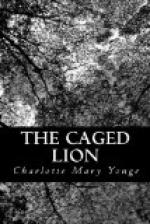‘This is no answer to the accusation, Sir Walter,’ said the Earl of Mar.
‘Accusation, forsooth!’ said Walter Stewart scornfully. ’Who dares to bear witness, if I did maintain my father’s lawful authority over peevish runaway wards of the Crown?’
‘Sir Walter,’ said the King, ’you would have done better to have waited and heard the whole indictment ere answering one charge. But since you demand who will dare to bear witness in this matter of the murder of Sir David Drummond of the Braes, and of the seizure of the Lady Lilias, here is one.’
So saying, and rising as he spoke, he held forth the reliquary that hung from a chain round his neck, keeping his gleaming tawny eyes fixed steadily straight upon Walter Stewart’s face.
That face, as he first had stood up, expressed the utmost amazement, and this gradually, under the lion glance, became more and more of dismay, quailing, collapsing visibly under the passionless gravity of that look. Even the tall form seemed to shrink, the eyes dilated, the brows drew closer together, and the chest seemed to pant, as the relic was held forth. There was a dead silence throughout the court as the King ceased to speak; only he continued to bend that searching gaze upon his prisoner.
‘Was it you?—was it your own self, my lord?’ he stammered forth at last, in the tone of one stricken.
’Yea, Walter Stewart. To me it was, and on this holy relic, that you made oath to abstain from all further spoil and violence until the King should come again in peace. How that oath has been kept the further indictments will show.’
‘I deemed it was St. Andrew,’ faltered the prisoner.
’And therefore that the oath to a heavenly saint would better bear breaking than one to an earthly sinner,’ replied James gravely. ’Read on, Clerk of the Court.’
The roll continued—a long and terrible record of violence and cruelty; the private warfare of the lawless young prince, the crimes of reckless barbarity and of savage passion—a deadly roll, in which indeed even the second abduction of Lilias was one of the least acts laid to his charge.
No lack of witnesses were there to prove deeds that had been done in the open face of day, in utter fearlessness of earthly justice, and defiance of Heaven. The defence that the prisoner seemed to have been prepared to us?—that those who sat to judge him had shared in his offences, and his daring power of brow-beating them, as he had so often done before, as son of the man who sat in the King’s seat—had utterly failed him now. He was mute; and the forms of the trial were gone through as of one whose doom was already sealed, but who must receive his sentence according to the strictest form of law, lest the just reward of his deeds should partake of their own violence. By the end of the day the jurors had found Walter Stewart guilty; and the doomster, a black-robed clerk, rising up, pronounced the sentence that condemned Walter Stewart of Albany to suffer death by beheading.




